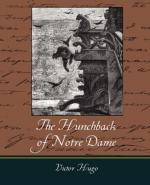|
This section contains 1,379 words (approx. 5 pages at 300 words per page) |

|
The Hunchback of Notre Dame: Fate, Destiny, and Free Will
Summary: Details how Victor Hugo's beliefs on Fate, Destiny, and Free Will are reflected in his novel.
Culture can best be defined as a way of life or the customs and beliefs of others. Throughout history authors have been known to display their own culture through their novels and other works. Many of them refer to their own experiences and beliefs in their writings. Victor Hugo is one of these authors that do this. Through the novel, The Hunchback of Notre-Dame, Hugo combines his personal beliefs and superstitions with those of his characters, through a display of fate, destiny, and free will.
Through the analysis of a Greek god, Hugo makes his first point of destiny in regards to his characters. In chapter nine of the novel the narrator speaks of the Greek god, Jupiter, saying he created man out of hatred of humankind and "his destiny holds his philosophy in a state of siege," (Hugo, 66). This means his knowledge in reference to humankind cannot...
|
This section contains 1,379 words (approx. 5 pages at 300 words per page) |

|


